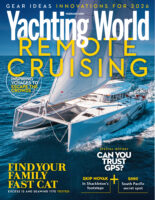Mike has hauled back 150 miles on the Vendée leaders and declares: "You almost need seat belts in this kind of environment."
Mike Golding has hauled back 150 miles on the leaders in just 48 hours, as strong winds propel him deeper into the Southern Ocean. Even the Ecover skipper can’t quite believe the rapid rate of progress, albeit he is still 450 miles off the lead.
“I’m a little surprised,” he admitted. “I don’t know if the guys ahead have a problem. They are in a bit more pressure than me, which may be slowing them down, but I’m surprised at the size of the gains. I’ve got this great tactic of putting up all the sail I can manage and going to bed. It seems to have worked out fine,” he said. Golding believes that going to sleep is “a good way of avoiding getting frightened”.
But he insisted he wasn’t pushing the boat excessively. “I’m not doing anything crazy here, at least I don’t think I am. But the reality is this system is moving away and the pressure is steadily dropping out and those guys will keep the pressure for longer. I’ve got to make all I can now because I’m going to lose a lot of it again. Once I fall off the back of this one, I’ve got to do my best to keep my fingernails into this system as long as I can. Every mile made now you get back two or three times over, because you’re in the system a little longer. If I can stay in the system even an extra half-day, that’s two or three hundred miles, and that’s worth having.”
Golding said the wind yesterday gave him exactly what he needed. He could choose his preferred wind strength almost as though he was turning the volume dial on a hi-fi system. “I had so much control over where I was in the system that I could turn the wind up by putting the bow up 10 degrees, and turn the wind down by putting it down 10 degrees. I was literally sailing in and out of isobars, depending on how much pressure I needed.”
He has rarely known the wind to be so co-operative. “The system is moving away from me now, but for a while I was able to go fast enough to catch it. The breeze dropped out at one point and I put more sail up for a couple of hours, and then the wind picked up again so I put the reefs back in.”
Golding managed to grab some good quality sleep last night, but admitted that the past day had been quite stressful. “Sometimes it’s quite scary. My best speed was over 30 knots at times, and the seas have been very big. It could have been an 8-metre swell at some points, and on top of that we’ve got a cross-sea, which makes it very bouncy and very awkward. So you’re always trying to find an angle where the boat doesn’t slam too hard, because it can start leaping waves or start burying into waves.
“All sorts of things start happening that you don’t usually see when you’re sailing at these speeds. I saw some ‘rooster-tailing’ off the rudder earlier, which is a little disconcerting because you know the rudder isn’t connected to the water at that point. You know that you’re pretty close to wiping out. It looked like a jet-ski, with a 15-20 foot rooster tail flying out the back.”
While rooster-tailing can look quite spectacular, it is a warning sign that the boat is on the very edge of control, particularly concerning for a singlehanded sailor who relies on the autopilot to do the lion’s share of the steering on a round-the-world adventure like this. Rooster-tailing is sailing’s equivalent of oversteer on a racing car, when a driver needs all his skill to keep the car from careering off the side of the track.
Once the rudder loses grip on the water, the boat is in big danger of broaching off sideways and the mast being knocked flat to the water. “Once these boats trip, they fall over big style,” said Golding, “but luckily a wave came along at the right time and knocked the bow back down, and the stall stopped, and away she went.”
Ecover is picking up some unwanted wildlife along the way. “This morning I’m sailing through what must be Jellyfish City. As the boat goes through the water, coming out of the bubbles there are these little jellyfish everywhere. All the rope bags and even the bottom of the mainsail is full of them.” At the rate the boat is travelling, Golding’s one-way ticket passengers will be a long way from home by the time they wobble off.
Ecover must surely have enjoyed one of her best 24-hour runs, but Golding says he’s not paying attention to such things. “I’m not very good at these averages. I tend to push it hard for a few hours and then I stop and have a rest. I really do turn it off every so often because it really is very stressful. You can’t even hold a drink to your mouth. I’ve got a nice little gash on my head when the boat buried and I smashed my head into a bulkhead. I have to be really careful around the computer because there is a real danger of getting thrown forward through the screens. You almost need seat belts in this kind of environment.”



